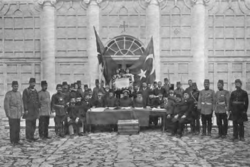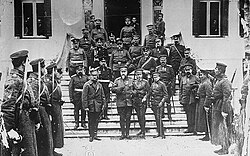
Back ثورة تركيا الفتاة Arabic Gənc türklər inqilabı Azerbaijani ژؤن تورک دئوریمی AZB Младатурэцкая рэвалюцыя Byelorussian Младотурска революция Bulgarian তরুণ তুর্কি বিপ্লব Bengali/Bangla Mladoturecká revoluce Czech Ungtyrkiske revolution Danish Κίνημα των Νεοτούρκων Greek Revolucio de la Junaj Turkoj Esperanto
| Young Turk Revolution | |||||||
|---|---|---|---|---|---|---|---|
| Part of the collapse of the Ottoman Empire | |||||||
 Declaration of the Young Turk Revolution by the leaders of the Ottoman millets in 1908 | |||||||
| |||||||
| Belligerents | |||||||
|
Supported by: |
| ||||||
| Commanders and leaders | |||||||
|
|
| ||||||
| History of the Ottoman Empire |
|---|
 |
| Timeline |
| Historiography (Ghaza, Decline) |
| Events leading to World War I |
|---|
 |
|
The Young Turk Revolution (July 1908; Turkish: Jön Türk Devrimi) was a constitutionalist revolution in the Ottoman Empire. Revolutionaries belonging to the Internal Committee of Union and Progress, an organization of the Young Turks movement, forced Sultan Abdul Hamid II to restore the Constitution, recall the parliament, and schedule an election. Thus began the Second Constitutional Era.
The revolution took place in Ottoman Rumeli in the context of the Macedonian Struggle and the increasing instability of the Hamidian regime. It began with CUP member Ahmed Niyazi's flight into the Albanian highlands. He was soon joined by İsmail Enver, Eyub Sabri, and other Unionist officers. They networked with local Albanians and utilized their connections within the Salonica based Third Army to instigate a large revolt. A string of assassinations by Unionist Fedai also contributed to Abdul Hamid's capitulation. Though the constitutional regime established after the revolution eventually succumbed to Unionist dictatorship by 1913, the Ottoman sultanate ceased to be the base of power of the empire after 1908.
Immediately after the revolution, Bulgaria declared independence from the Ottoman Empire and Austria-Hungary's annexation of nominal Ottoman territory sparked the Bosnian Crisis.
After an attempted monarchist counterrevolution known as the 31 March incident in favor of Abdul Hamid the following year, he was deposed and his half-brother Mehmed V ascended the throne.